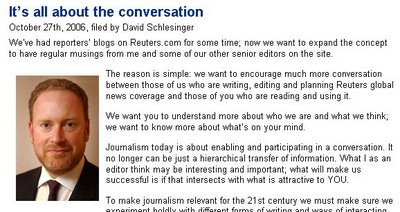Parting the Curtain

it may be that Schlesinger is the most senior editorial executive blogging (though not the highest paid. See Katie Couric or Brian Williams or Charles Gibson for that.)
There is something new going on at the traditionally stodgy place where I used to work. I've already written about Reuters' foray into covering non-events from a place that doesn't exist by opening a "bureau" in the Sims-like online community, Second Life. This may be too hip to be cool or too cool to be hip, but either way it is iconic rather than informative.
Now, the global managing editor at Reuters, David Schlesinger, is taking the lead in blogging for senior editors at the news agency. This is notable in at least three respects:
- Reuters has always been exceptionally insulated, not behaving as if it were terribly concerned with public image
- Reuters has tended to be at best reluctantly reactive to the discussion of journalism hot topics, engaging in public discourse only when necessary and usually only to defend itself
- Reuters has been slavishly devoted to the notion of not appearing to take sides on anything
So now we have a conversation about news coverage in general and Reuters' approach to it in particular laid out by the executive most responsible for it, for all the world to see.
As a former insider I am, frankly, astonished. In the two weeks or so since inception Schlesinger has already taken up citizen journalism and deciding what's news in his occasional entries. Global Editor for Political and General News Paul Holmes has blogged about the plight of Iraqi nationals who work for Reuters covering the war. He responded to a number of tough questions about the pay and conditions for these local hires, whose contribution to the world's knowledge about what is going on there is scandalously unappreciated and even unknown by the general public.
I haven't made an exhaustive study of this, but it may be that Schlesinger is the most senior editorial executive blogging (though not the highest paid. See Katie Couric or Brian Williams or Charles Gibson for that.)
I don't expect the Reuters Editor blog to be quite as transparent or prolific as the those by the U.S. TV networks, and it isn't exactly an ombudsman's space either. But it does seem to be a sincere attempt to go public by a congenitally non-publicity-seeking company.
It may be that I may be able to say so and that David couldn't possibly comment, but since he is an old Asia hand with extensive knowledge of China culture, history and politics, I would wager that the irony cannot possibly have escaped him.


Comments